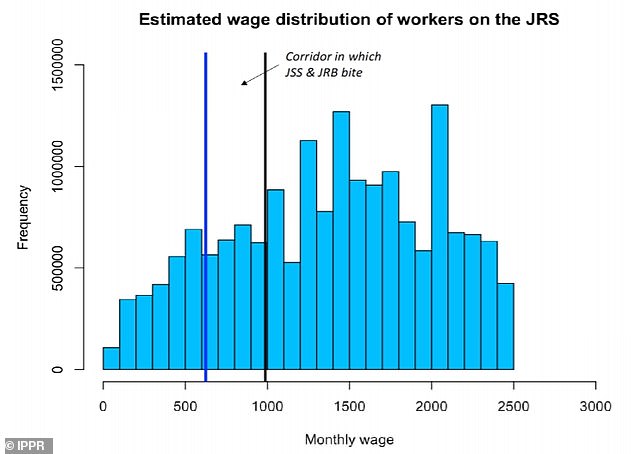Government’s jobs schemes could save just 230,000 ‘viable jobs’, because too many don’t earn ‘goldilocks’ wages, claims think tank
- IPPR: ‘Crucially, this is a design issue and not a question of overall funding’
- The authors of ‘The Narrow Corridor’ recommend introducing a ‘JRB+’ scheme
- From Nov. 1, the JSS scheme will replace the government’s current JRS scheme
Almost 1.8 million viable jobs could be lost, because the government’s Job Support Scheme (JSS) and Job Retention Bonus (JRB) are designed to only benefit a modest number of workers, according to a new report.
The Institute for Public Policy Research, a left wing think tank, has called on the Chancellor Rishi Sunak to change course to prevent a surge in unemployment once the current furlough scheme ends.
They say that the schemes will only save the jobs of around 230,000 people whose earnings are in the ‘goldilocks’ corridor of between £625 and £987 per month and are in a ‘viable job.’

The Institute for Public Policy Research wants Chancellor Rishi Sunak (above) to change course on his employment support schemes to prevent a surge in redundancies
Those who make less than that amount will not qualify for the JRB, and for people who earn above the threshold, there is too little economic incentive for employers to keep them on.
Under the government’s proposed JRB measure, firms can claim a £1,000 one-off payment for every employee that they continuously furloughed until January 31 next year.
The authors of ‘The Narrow Corridor’ report, Henry Parkes and Carsten Jung, instead recommend the Treasury introduce a ‘JRB+’ scheme that gives companies a monthly payment that is proportionate to wages for hours worked part-time.
They also suggest that firms which only qualify for the JSS should be granted the payment, and that the two schemes should be designed to run in tandem with each other.


Only about one in ten people on the Job Retention Scheme earn somewhere in the ‘goldilocks’ corridor of between £625 and £987 per month and are in a ‘viable job.’
The pair believe such measures would incentivise companies to adopt work sharing, cost less money, and save hundreds of thousands of viable jobs in industries like manufacturing, hospitality and construction.
‘This ‘JRB+’ would have the advantage of benefiting those workers who need support and are outside the narrow corridor of wages for which the scheme currently acts as an incentive to keep workers on,’ write Parkes and Jung.
They add: ‘Crucially, this is a design issue and not a question of overall funding. We estimate the JRB+ together jointly with the JSS would cost slightly less than the money set aside for the JRB.’


The IPPR authors believe a JRB+ scheme would incentivise companies to adopt work sharing, and save hundreds of thousands of viable jobs in industries like manufacturing
The JSS scheme will replace the government’s current Job Retention Scheme when it expires on October 31. When the JRS was first introduced, furloughed workers could get 80 per cent of their wages up to £2,500 a month.
From November 1, the new – and less generous – scheme will require staff members to work at least a third of their regular allotted hours, for which their employer will pay them for that time.
For hours they do not work, the employer and government will each pay a third of the remaining salary, meaning a worker can receive up to 77 per cent of their usual earnings.
In addition to the proposed changes to the JRB, the IPPR wants extra support provided to businesses forced to stop trading because of local lockdowns along with companies ‘that have been unable to reopen across the country – such as many arts and events businesses.’
